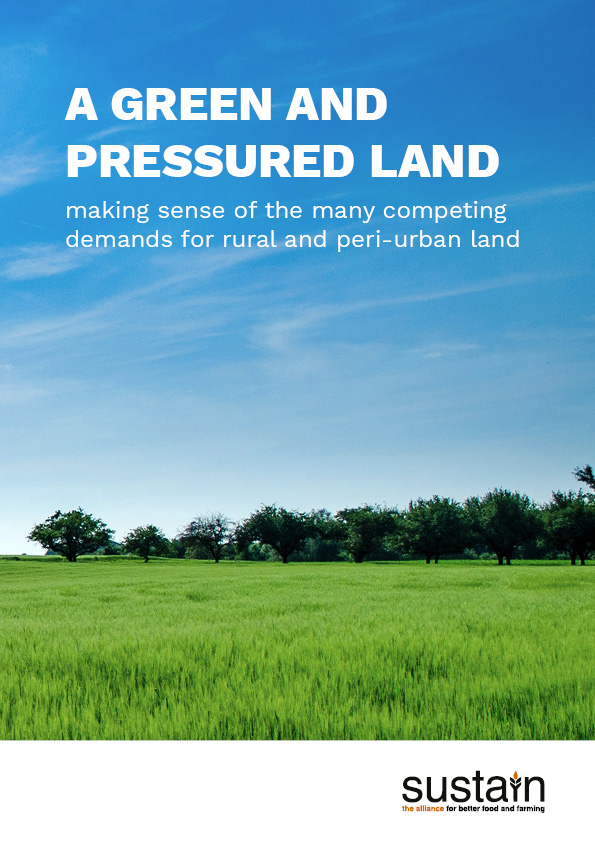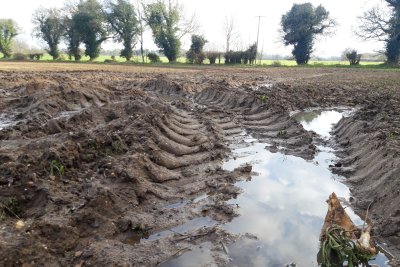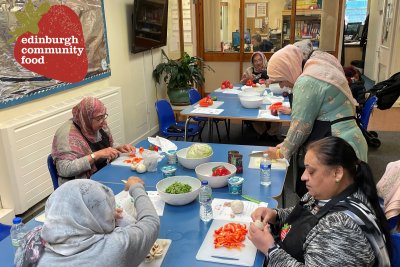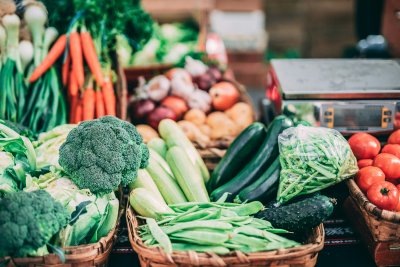Blogs • Sustainable Farming Campaign
A green and pressured land - new report on making sense of the many competing demands for rural and peri-urban land
Sustain is today publishing a briefing on land use "A Green and Pressured Land - making sense of the many competing demands for rural and peri-urban land" . This looks at the many pressures on land in the UK and our use of land overseas, including the impact of agriculture and the types of food consumed.
 The briefing illustrates the many current competing demands on land now and future new demands due to climate mitigation, changing consumption and the need to reduce our global footprint. Do we need to make more, or less space for those uses? The explores the following demands:
The briefing illustrates the many current competing demands on land now and future new demands due to climate mitigation, changing consumption and the need to reduce our global footprint. Do we need to make more, or less space for those uses? The explores the following demands:
- Biodiversity and nature – there are many ways we can address this on the spectrum of land sparing to land sharing, including using agro-ecological farming approaches. What should we be doing to maximise outcomes for nature in balance with other needs?
- More trees, hedgerows and forestry are key for climate mitigation but there is a risk if we replace food growing with trees. Any changes in such land use need to be managed carefully. We can grow fruit, nut and fodder trees too to get a double benefit. There should also be a core role for agroforestry, mixing trees with livestock rearing and for protecting exisiting trees and woodland.
- We need new entrants in farming and horticulture but they need affordable land. How can we give them space to grow?
- Tackling greenhouse gas mitigation and adaption in land use are critical to the UK's plan for adressing the climate emergency. How do we do that, such as growing more trees, protecting peat soils, without offshoring food production and environmental harm?
- More fruit and vegetable production in the UK is needed given the vulnerability and sustainability of our current global supplies and because we need to eat more. Can we find space in rural and peri-urban areas for this and how do we ensure the production is sustainable?
- Land for livestock rearing and animal feed production is hugely contentious. We need to consider how much land we use overseas as well as here as so much feed and meat is imported. Producing less and better meat and dairy should be part of the solution (alongside dietary shifts), balancing production alonside other land use requirements and integrating livestock production better with crops.
- Will new technology like vertical farms be the answer? Many investors are certainly keen on the idea and the sector is growing. But there are limits and downsides which need to be recognised.
- Large-scale bioenergy, biomass, biofuels, and solar farms can all provide energy to replace fossil fuels but can have a major land take. Is this the best use of land? Does it mean we don’t decarbonise elsewhere? Could it displace food growing to other countries?
- New development, buildings and infrastructure take land but a surprisingly small amount in the UK, but we do need to protect land that is good for agriculture and for nature from unsustainable developments.
- land for leisure, including golf courses and for game shoots are under scrutiny. Making land accessible for our well-being and to we can have access to nature are vital but are these current large land users open to all? Are they protecting nature and helping address climate change?
It is clear that how land is used matters, not just because it is finite. This briefing looks at some of the ways in which UK farming systems and land management could be developed to meet the food, environment, and health challenges ahead, noting that this is also highly charged politically. Devolved nations all have land use strategies and so England, with no overall framework or coherent approach is lagging behind.
With the climate emergency and the need to make major emissions reductions from land becoming crucial, the real and perceived land conflicts are gaining ever greater attention. Brexit and the Covid-19 pandemic are also generating calls for greater self-sufficiency in some food and feeds and bioenergy as well as better protection of green spaces so we all can have access to nature.
We need to better tools to make decisions on what land is for. This is a discussion briefing to contribute to the debate, so we are not recommending specific changes or tagets. But we do provide eight overarching recommendations and principles to help drive better land use policy including:
- The need for all organisations, agencies, political parties and researchers to consider the whole land requirement and impacts when suggesting new land uses. They should be able to assess what unintended consequences could be caused by changes and how they can be mitigated.
- Providing adequate support for landscape scale and catchment-scale approaches in the new farm and land manager support schemes in each nation.
- The development of a comprehensive English Land Use Strategy to help prepare for the impacts of climate change and to juggle the multiple needs, simultaneously preserving food production and land for other uses and development, ensuring a fair and inclusive process (building on some of the best practice of the Scottish Land Commission and Welsh land use strategy).
- Protection of public land assets, including the county farms estate, from unsustainable development - making it an exemplar of regenerative use and maximising its potential for new entrants into farming and the education and skills development value.
We welcome feedback to vicki@sustainweb.org.
Published Wednesday 3 June 2020
Sustainable Farming Campaign: Sustain encourages integration of sustainable food and farming into local, regional and national government policies.





